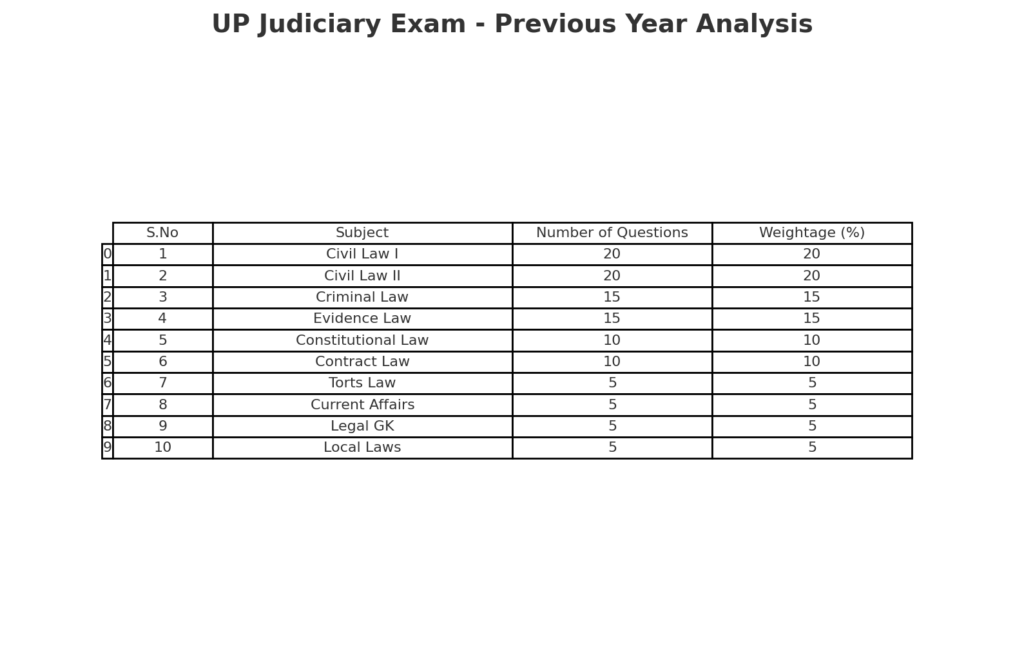
Understanding the UP Judicial Services Exam
The UP Judicial Services Exam, conducted by the Uttar Pradesh Public Service Commission (UPPSC), is an esteemed examination aimed at recruiting competent individuals for the role of Civil Judge. This examination is a golden opportunity for law graduates to enter the esteemed judicial services.
The Three-Tiered Exam Pattern
- Preliminary Examination: This is the first hurdle and consists of objective-type questions. It’s a test of your fundamental legal knowledge and understanding.
- Main Examination: This is where your in-depth understanding of the law is tested. It’s a descriptive exam that assesses your analytical skills and legal aptitudes.
- Interview: The final frontier, this round evaluates your personality, suitability for the role, and your approach to legal scenarios.
Syllabus: The Backbone of Your Preparation
The syllabus is vast and covers a plethora of subjects, including the Indian Penal Code, Civil Procedure Code, Criminal Procedure Code, Indian Evidence Act, and more. Don’t just learn the law; understand its nuances and applications.
Preparation Tips: The Art of Mastering the Exam
- Conceptual Clarity: Grasp the core concepts of each legal subject. It’s not about rote learning but understanding the ‘why’ and ‘how’ of legal provisions.
- Regular Revision: Law is vast, and regular revision is key. Make concise notes for quick revisions.
- Solve Previous Years’ Papers: This helps you understand the exam pattern and the type of questions asked.
- Mock Tests: Regular mock tests improve your speed and accuracy, two crucial aspects of this exam.
- Stay Updated: A good lawyer is always informed. Stay updated with the latest legal developments and current affairs.
- Health is Wealth: A sound mind in a sound body solves cases efficiently. Maintain a healthy lifestyle and a balanced routine.

The Power of Persistence
Remember, persistence is the key. This exam is challenging, but with determination and consistent effort, you can crack it. Every article you read, every case law you understand, and every mock test you take, brings you a step closer to your goal.
Conclusion: The Beginning of a Noble Journey
As you embark on this journey, remember that you are not just preparing for an exam but for a career that upholds justice. The UP Judicial Services Exam is not just a test; it’s a doorway to becoming a custodian of the law, a protector of rights, and a champion of justice.
Scheme & Previous Year Exam Analysis of UP Judiciary

The previous year’s UP Judiciary Exam analysis, as depicted in the table, presents a comprehensive overview of the question distribution across various legal subjects. In this hypothetical scenario, Civil Law I and II each contributed a significant 20% of the total questions, emphasizing their importance in the examination. Criminal Law and Evidence Law followed closely, each constituting 15% of the exam. Constitutional Law and Contract Law were also notable, each accounting for 10%. Lesser focus was given to Torts Law, Current Affairs, Legal General Knowledge, and Local Laws, with each of these subjects comprising 5% of the exam. This analysis highlights the varied nature of the UP Judiciary Exam, underscoring the need for a well-rounded understanding of multiple legal domains. Such insights are invaluable for candidates in strategizing their preparation to cover the most weighted areas effectively.

